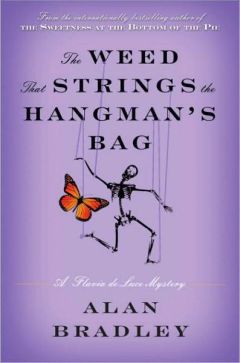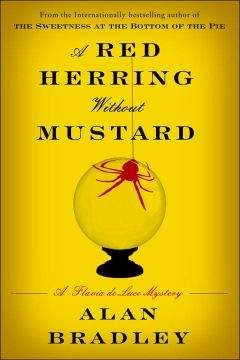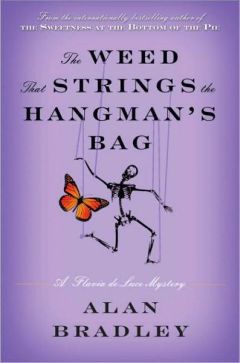Alan Bradley - The Weed That Strings the Hangmans Bag

Скачивание начинается... Если скачивание не началось автоматически, пожалуйста нажмите на эту ссылку.
Жалоба
Напишите нам, и мы в срочном порядке примем меры.
Описание книги "The Weed That Strings the Hangmans Bag"
Описание и краткое содержание "The Weed That Strings the Hangmans Bag" читать бесплатно онлайн.
"She sounds very clever," I said.
"She was all of that." Miss Puddock laughed. "All of that and more. And no wonder! One of our customers once told us — an RAF Squadron Leader, I think he was — and in confidence, of course — that Grace had the highest IQ he'd ever seen in 'the fairer sex,' as he put it: that if the people in Special Operations hadn't whisked her off to do top secret work, she might well have spent the rest of the war installing wireless sets in Spitfires."
"Top secret work?" I gasped. The thought of Grace Ingleby doing anything other than cringing in her dovecote tower, like a captive maiden waiting to be rescued by Sir Lancelot, was almost laughable.
"Of course, she would never breathe a word about it." Miss Puddock lowered her voice, in the way that people often do when they talk about the war. "They're not allowed to, you know. But then, we seldom see her nowadays. Since that tragedy with her little boy — "
"Robin," I said.
"Yes. Since then, she keeps to herself. I'm afraid she's not at all the same laughing girl who used to put Peter the Great in his place."
"Was Gordon a member of Special Operations, too?" I asked.
"Gordon?" She laughed. "Good lord, no. Gordon's 'a farmer born and a farmer he shall die,' as Shakespeare wrote, or was it Harry Lauder, or George Formby, or someone like that? My memory's gone all wormholes, and so will yours, in time."
I couldn't think what to say, and I saw at once she thought she'd offended me.
"But not for many a year, dear. No, I'm quite sure your memory will still be going strong when the rest of us are in our graves and paved over for parking at the bowling palaces."
"Have you seen Mrs. Ingleby recently?" I asked.
"Not since Saturday night at the parish hall. Of course I had no opportunity to chat, what with our little musicale on my mind. The rest of the evening was a nightmare, wasn't it: the death of that poor man — the puppet that was carved with Robin's face? I don't know what Gordon was thinking, bringing Grace there when she's so fragile. But then, he had no way of knowing, did he?"
"No," I said. "I don't suppose he did."
By the time I set out for Buckshaw, it was well past lunchtime. Fortunately, Miss Puddock had wrapped a couple of buttered scones in paper and insisted upon tucking them into my pocket. I nibbled at them absently as I pedaled along the road, lost in thought.
At the end of the high street, the road made a gentle angle to the southwest as it skirted the southern perimeter of St. Tancred's churchyard.
If I hadn't glanced to my right, I mightn't have seen it: the Austin van, with "Porson's Puppets" in gold letters on its panels, parked at the side of the parish hall. Gladys's tires skidded in the dust as I applied her hand brakes and swerved into the churchyard.
As I pulled up, Nialla was stowing odds and ends in the van's interior.
"You've got it running!" I shouted. She gave me the kind of look that you might give to a bit of dog dirt in your porridge, and went on with her packing.
"It's me, Flavia," I said. "Have you forgotten me already?"
"Piss off, you little traitor," she snapped. "Leave me alone."
For an instant, I thought I was back at Buckshaw, talking to Feely. It was the kind of dismissal I've lived through a thousand times — and survived, I thought. I decided to stand my ground.
"Why? What have I done to you?"
"Oh, come off it, Flavia. You know as well as I do. You told the police I was at Buckshaw. They thought I was hiding out, or running away, or whatever you want to call it."
"I did no such thing!" I protested. "I haven't laid eyes on a policeman since I saw you in the coach house."
"But you were the only one who knew I was there."
As it always did when I was angry, my mind burned with crystal clarity.
"I knew you were there, Dogger knew you were there, and so did Mrs. Mullet, to name but three."
"I can hardly believe Dogger would peach on me."
"And nor would Mrs. Mullet," I said.
Good Lord! Was I actually defending Mrs. M?
"She may be a bloody gossip, but she's not mean," I said. "She'd never rat on you. Inspector Hewitt came to Buckshaw — probably to ask me a few more questions about Saturday night — and happened to see you walking from the coach house to the kitchen. There's no more to it than that. I'm sure of it."
I could see that Nialla was thinking about it. I wanted nothing more than to take her by the shoulders and give her a good shaking, but I had to keep in mind the fact that her emotions were being stoked by a storm of hormones: fierce clouds of hydrogen, nitrogen, oxygen, carbon, and sulfur, combining and recombining in the eternal dances of life.
It almost made me forgive her.
"Here," I said, pulling the butterfly compact dramatically from my pocket and holding it out towards her. "I believe this belongs to you."
I hugged myself in anticipation of a tidal wave of gratitude and praise. But none came.
"Thanks," Nialla said, and pocketed the thing.
Thanks? Just thanks? The nerve! I'd show her: I'd pretend she hadn't hurt me; pretend I didn't care.
"I can't help noticing," I remarked casually, "that you're packing the van, which means that Bert Archer's repaired it and you're about to be on your way. Since Inspector Hewitt is nowhere in sight, I expect that means you're free to go."
"Free?" she repeated, and spat in the dirt. "Free? The vicar's given me four pounds, six shillings, and eightpence from the show. Bert Archer's bill comes to seven pounds ten. It's only because the vicar put in a word for me that he's willing to let me drive to Overton to pawn whatever I can. If you call that free, then I'm free. It's all bloody well and good for Little Miss Nabob, who lives in a country house the size of Buckingham Palace, to make her smart-pants deductions. So think what you like, but don't bloody well patronize me!"
"All right," I said. "I didn't mean to. Here, take this, please."
I dug into my pocket again and pulled out the coin, the one Aunt Felicity had foisted upon Dogger, thinking it was a shilling. Dogger, in turn, had planted it in my pocket, believing, perhaps, that it would soon be spent on horehound sticks at Miss Cool's shop.
I handed it to Nialla, who looked at it with disbelief.
"Fourpence!" she said. "Bloody fourpence!"
Her tears were flowing freely as she flung it away among the tombstones.
"Yes, it is only fourpence," I said. "But it's fourpence in Maundy money. The coins are produced by the Royal Mint, to be handed out by the Sovereign — "
"Blow the Sovereign!" she shouted. "And blow the Royal Mint!"
" — on Maundy Thursday. They're quite rare. If I remember correctly, Bert Archer is a coin collector, and I think you'll find the Maundy fourpence will more than pay for the van."
With all the righteous dignity I could muster, I grabbed Gladys by the handlebars and shoved off for home. When I looked back from the corner of the church, Nialla was already on her hands and knees, scrabbling in the churchyard grass, and I couldn't tell whether the tears she was wiping away were tears of anger or of happiness.
* TWENTY-SIX *
"ALL RIGHT, DOGGER," I SAID, "the jig is up."
I had found him in the butler's pantry, polishing Father's shoes.
Dogger's duties at Buckshaw varied in direct proportion to his present capabilities, his participation in our daily life rising and descending, rather like those colored balls in Galileo's thermometer that float at different levels in a glass tube, depending on the temperature. The fact that he was doing shoes was a good sign. It indicated clearly that he had advanced once again from gardener to butler.
He looked up from his work.
"Is it?" he asked.
"Cast your mind, if you please, back to Saturday evening at the parish hall. You're sitting beside me watching Jack and the Beanstalk when suddenly something goes wrong backstage. Rupert comes crashing down dead, and within minutes you are telling me that you fear we have seen murder. How did you know that? How did you know it wasn't an accident?"
This question had been gnawing away at my subconscious like a rat at a rope, but until that very moment, I had not been fully aware of it.
Dogger breathed on the upper of one of Father's regimental half-wellingtons before he answered, giving the glassy black surface a final loving rub with his shirtsleeve.
"The circumstances spoke against it," he said. "Mr. Porson was a perfectionist. He manufactured all his own equipment. A puppeteer works in the dark. There's no room for error. A frayed electrical wire was out of the question."
"It wasn't frayed," I said. "I spotted it when I was backstage with Inspector Hewitt. The insulation was scraped away."
"I should have been surprised if it wasn't," he said.
"Congratulations on a brilliant deduction," I said, "although it's one that didn't occur to me."
And it certainly hadn't, because the female mind doesn't work that way.
Seen from the air, the male mind must look rather like the canals of Europe, with ideas being towed along well-worn towpaths by heavy-footed dray horses. There is never any doubt that they will, despite wind and weather, reach their destinations by following a simple series of connected lines.
But the female mind, even in my limited experience, seems more of a vast and teeming swamp, but a swamp that knows in an instant whenever a stranger — even miles away — has so much as dipped a single toe into her waters. People who talk about this phenomenon, most of whom know nothing whatsoever about it, call it "woman's intuition."
Although I had arrived at much the same conclusion as Dogger, it had been by a very different route.
In the first place, although it was obvious that Rupert had been murdered for what he had done to a woman, I think I had known almost from the moment of his death that Nialla was not his killer.
"The instant he came crashing down onto the stage," I said, "Nialla leaped to her feet and moved towards him. Her first, and automatic, impulse was to go to his aid."
Dogger rubbed his chin and nodded.
"But she forced herself to stop," I went on, "as soon as she saw the smoke and the sparks. She quickly realized that touching any part of his body could mean instant death. For her — and her baby."
"Yes," Dogger said. "I noticed that, too."
"Therefore, Nialla is not the murderer."
"I believe you can safely remove her from your list," said Dogger.
It wasn't until I was halfway along the road to Culverhouse Farm that I realized how tired I was. I'd been up before the sun and had been going flat out ever since. But time was of the essence: If I didn't get there before Inspector Hewitt, I wouldn't know the gruesome details until I read about them in the News of the World.
This time, rather than crossing the river behind the church, I had decided to go round by the Hinley road and approach the farm from the west. By doing so, I would have the advantage of height to survey the terrain, as well as keeping to the cover of Gibbet Wood. Now that the noose was tightening, so to speak, it would never do to be ambushed by a cold-blooded killer.
By the time I was halfway up the chalky road of Gibbet Hill, I felt as if my blood were mud, and my shoes were made of lead. Under any other circumstances, I might have crawled into a quiet thicket for a nap, but it was not to be. Time was running out and, as Father was so fond of saying, "Tired is a mucker's excuse."
As I listened to the wind sighing and whispering in the treetops of Gibbet Wood, I found myself half hoping that Mad Meg would leap out and divert me from my mission. But this, too, was not to be: Aside from a yellowhammer tapping away like a busy shoemaker at the far side of the wood, there were no signs of life.
When I reached the top of the hill, Jubilee Field sloped away from me towards the river, a blanket of electric blue. At the outbreak of war, Gordon had been made to grow flax, or so Mrs. Mullet had told me, by order of HM Government, who required the stuff to manufacture parachutes. But the Battle of Britain had been years ago, and parachutes were no longer required in anywhere near the same quantity.
Still, working under the cloak of wartime necessity, it seemed that Gordon had managed to keep his secret crop of cannabis tucked handily away among the trees of Gibbet Wood, its very existence known to no more than a handful of people.
Which one of them, I wondered — if it was one of them — besides hating him passionately enough to kill, possessed sufficient electrical knowledge to have put the jolt to Rupert Porson?
A flash of light caught my eye: a reflection from the side of the road. I saw at once that it was one of Mad Meg's roadside junk ornaments, dangling by a string from a bramble bush. It was no more than a jagged bit of chrome trim, jarred loose from the radiator of some passing motorcar by the roughness of the road. Hanging beneath it, and twisting idly in the sun (it was this that had caught my eye) was a small ridged circular disk of silver which, judging by its red stains, had once been the lid on a half-pint tin of paint.
It reminded me, oddly enough, of something I had experienced the previous year when Father had taken Ophelia, Daphne, and me up to London for midnight mass at the Brompton Oratory. At the elevation of the Host, as the priest held the round white wafer (which some of us believed to be the Body of Christ) above his head for an inordinately long time, it had for just an instant caught the light from the candles and the colored reflections of the chancel, glowing with an unearthly iridescent sheen that was neither solid nor vaporous. At the time, it had seemed to me a signal that something momentous was about to happen.
Now, at the verge of Gibbet Wood, the oiled teeth of some mental cogwheel fell into place with a series of almost audible clicks.
Church. Click! Vicar. Click! Circle suspended. Click! Bicycle clip. Click! Paint lid. Click! Meg. Click!
And I saw as if in a blinding vision: The vicar had been here at Culverhouse Farm last Thursday. It was here that he had caught his trouser leg in the bicycle chain and lost his clip. He had been wearing it after all! And it was here in the chalky dust that he had taken a tumble. The white smudges on his black clerical garb had come from this very road.
Mad Meg, the perennial magpie, had found the clip — as she did with all shiny metallic objects dropped in the vicinity of Gibbet Wood — and Meg had picked it up and brought it with her to the vicarage.
Her turned me out. Took old Meg's bracelet and turned her out. Dirty, dirty!
Meg's words echoed in my memory. She had been talking about the vicar's wife.
It was Cynthia Richardson who had taken the bicycle clip — Meg's "bracelet" — away from her, and shooed her out of the vicarage.
Подписывайтесь на наши страницы в социальных сетях.
Будьте в курсе последних книжных новинок, комментируйте, обсуждайте. Мы ждём Вас!
Похожие книги на "The Weed That Strings the Hangmans Bag"
Книги похожие на "The Weed That Strings the Hangmans Bag" читать онлайн или скачать бесплатно полные версии.
Мы рекомендуем Вам зарегистрироваться либо войти на сайт под своим именем.
Отзывы о "Alan Bradley - The Weed That Strings the Hangmans Bag"
Отзывы читателей о книге "The Weed That Strings the Hangmans Bag", комментарии и мнения людей о произведении.






